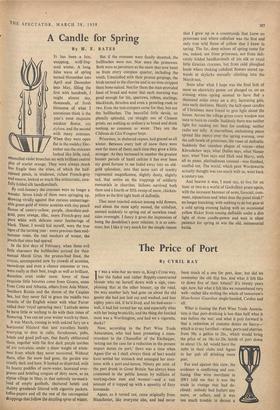A Candle for Spring
By H. E. BATES By mid-January the crocuses were no longer a Wonder. Seven kinds of them were springing up, showing vividly against that curious unmarriage- able green-gold of winter aconites with tiny pencil flames of canary-yellow, purple, chocolate-and- gold, pure orange, lilac, more French-grey and Pure white with delicate outer featherings of black. These, I would kid myself, were the true signs of the turning year : more precious than mid- summer roses, the real mockers of winter, the jewels that mice had spared.
In the first days of February, when those evil little charmers the bullfinches arrived for their annual Mardi Gras, the prunus-bud feast, the crocus, accompanied now by crowds of aconites, snowdrops and even a chance anemone or two, were really at their best, tough as well as brilliant, dauntless even under snow. Some of these exquisite little beauties come from Greece, some from Crete and Albania, others from Asia Minor, Southern Russia and the shores of the Caspian Sea, but they never fail to grace the middle two months of the English winter with what Farrer called their 'royal upstaring stars.' Latitude seems to have little or nothing to do with their times of flowering. You can sot your winter watch by them.
It was March, coming in with unkind fury on a horizontal blizzard that sent travellers hastily scurrying to doss in cafés, farmhouses, pubs, hotels and good pull-ups, that finally obliterated them, together with the first dark purple torches of iris reticulata, under a .sheer weight of white- ness from which they never recovered. Without them, after the snow had gone, the garden was cruelly dark and bare. It looked as dispirited, with its foamy puddles of snow-water, lacerated ever- greens and bristling tongues of dirty snow, as an alpine village in May, in that unlovely no-man's- land of empty gasthofs, shuttered hotels and shabby grasslands littered with cigarette packets, toffee-papers and all the rest of the uncongenial droppings that follow the dazzling spree of winter. But if the crocuses were finally daunted, the bullfinches were not. Nor were the primroses. Both were as persistent as the snow that now beset us from every compass quarter, including the south. Unsatisfied with their prunus gorgings, the birds turned to the cherries and in no time stripped them bone-naked. Not for them the man-provided feast of bread and water that each morning was good enough for tits, sparrows, robins, starlings, blackbirds, thrushes and even a prowling rook or two. Even the tree-creepers came for that, but not the bullfinches. The beautiful little devils, so plumily splendid, cut straight out of Chinese prints, eat nothing so ordinary as bread and drink nothing so common as water. They are the Chateau de Clos Vougeot boys.
Primroses, in sheltered copses, had graced us all winter. Between every belt of snow there were now far more of them; each time they grew a little stronger. As they increased in number the greatest banner parade of hazel catkins it has ever been my good fortune to see faded away into an old- gold splendour, into that same sort of tawdry regimental magnificence, slightly dusty, slightly sad, that settles on the trappings of soldierly memorials in churches. Sallows survived both them and a fourth or fifth sweep of snow, chicken- yellow as the first tight buds of daffodils.
That most rejected outcast among wild flowers, and about the most aptly named, the coltsfoot, seemed suddenly to spring out of snowless road- sides overnight. 1 fancy it gives the impression of being the dandelion's poor relation; it is so com- mon; but I like it very much for the simple reason that I grew up in a countryside that knew no primroses and where coltsfoot was the first and only true wild flame of yellow that I knew in spring. The far, deep echoes of spring come for me, indeed, not from primroses, not from deli- cately folded handkerchiefs of iris silk or royal little Grecian crocuses, but from cold ploughed lands where shaking coltsfoot flowers stared up- wards at skylarks eternally climbing into the March sun.
Soon after what I hope was the final lash of snow an electricity power cut plunged us, on an evening when spring seemed to have fled a thousand miles away on a dry, lacerating gale, into early darkness. Hastily the half-spent candles of Christmas were found to give light about the house. Across the village green every window was seen to burn its candle. Suddenly there was neither light for reading nor heat for cooking; neither radio nor telly. A marvellous, embalming peace spread like mercy over the spring evening, over the soft bowls of primroses, the vases of daffodils. Suddenly that ceaseless plague of voices—what Khrushchev says, what Dulles says, what Nasser says, what Tom says and Dick and Harry, with all its pious, platitudinous counsel—was finished, snuffed out. The world, which poor Wordsworth actually thought was too much with us, went back a century too.
And heaven it was, I must say, to live for an hour or two in a world of Gaskellian peace again, with the incessant hammer of news, forecast, com- ment, injunctions and 'what does the panel think?' no longer knocking; with nothing to do but gaze at a cold spring evening fading with an occasional yellow flicker from tossing daffodils under a dim light of three candle-power and wait in silent patience for spring to win the old, immemorial battle.










































 Previous page
Previous page